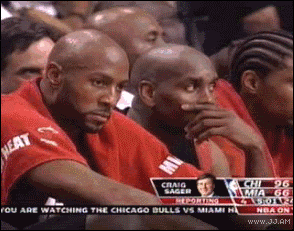ginobiliflops wrote:^ That trade broke my heart.
The Person-McDyess deal? Interesting. Overall, I liked the trade at the time because of McDyess' upside; he figured to give the Suns their power forward of the future while helping in the present as well. But I did feel some ambivalence about the deal due to the loss of Person and the breakup of Phoenix's four-guard offense from the stretch drive of the previous season. Conversely, the media—and perhaps the Suns' management—acted as if the trade constituted a total steal for Phoenix. As I indicated, not only did the loss of Person end up hurting the Suns badly over the long haul (and the team would have missed him even if McDyess had re-signed), but the three first-round draft picks that Phoenix surrendered in that transaction cost the club as well.
Even during the '97-'98 season, the Suns evidently felt that they missed Person to some extent because they traded Cedric Ceballos to Dallas after the All-Star break for veteran three-point bombardier Dennis Scott. Scott was actually in shape that year and would play well for Phoenix, shooting .449 on threes, but after a home win over the Lakers on February 18, 1998, Ceballos overheard Jason Kidd, Rex Chapman, Kevin Johnson, and Danny Manning vociferously arguing with head coach Danny Ainge, in Ainge's office, telling their coach not to trade him. Those teammates all felt that Ceballos—in addition to being a productive player when he received the opportunity—was great for the team's chemistry, even when he was not in the playing rotation. But Ainge, looking ahead to the playoffs, understandably wanted another three-point shooter and floor spacer on the roster. The irony is that with Person no longer a member of the team, Ainge would turn to Scott, who as Ceballos noted, Ainge had privately disparaged for years. (And Scott would not return to Phoenix after the season, despite having done a good job.) So Ceballos, too, was something of a casualty of the McDyess trade and the loss of Wesley Person.
In another irony, McDyess came on as that season progressed, but overall, Phoenix failed to fully take advantage of his ability. When the Suns really found their stride late in the season, winning ten games in a row, he averaged 20.7 points, 7.8 rebounds, 2.7 blocked shots, and 1.6 steals in 32.4 minutes during the streak, shooting .679 from the field. Phoenix's most impressive victory of the year probably came at the Great Western Forum against the Lakers, who would win 61 games that season and reach the Western Conference Finals. On April 10, 1998, one game after losing Danny Manning for the season with a torn ACL, McDyess posted 37 points (15-23 FG, 7-11 FT) with 12 rebounds, 3 assists, 2 blocked shots, and 5 steals (one of ten games that season where he recorded multiple blocks and multiple steals in the same contest).
http://www.databasebasketball.com/teams/boxscore.htm?yr=1997&b=19980410&tm=LALI distinctly remember watching that game. McDyess had developed twenty-foot shooting range over the course of that season, and he and Kevin Johnson (15 points on 5-7 FG, 5-6 FT, 8 assists, and 4 rebounds in 28 minutes off the bench) worked the pick-and-roll/pop just beautifully—perhaps I should say clinically—in that game. Bill Walton was raving about it on the TNT broadcast, saying that if McDyess just played off Johnson, things would be very easy for him. As noted in the
Arizona Republic:
Kevin Johnson came off the bench to give the Suns 28 minutes of solid basketball, teaming with McDyess to pick-and-roll the Lakers into submission. KJ scored 15 points, handed out eight assists and directed a 32-22 Phoenix second quarter that gave the Suns control of the game. https://www.newspapers.com/newspage/124407217/
McDyess' combination of scoring abilities was rather akin to Amar'e Stoudemire's in Phoenix, except that he possessed some post-up moves, too, and then he actually played defense on the other end. The combination of McDyess and a veteran K.J. in the pick-and-roll/pop thus could have been analogous to Stoudemire and a veteran Steve Nash on the play years later—if the 1998 Suns had featured it more. When Phoenix showcased that combination in that game, the Lakers had no answers, and overall, McDyess' surge late in that season probably reflected, in part, the fact that K.J.'s minutes increased a bit down the stretch. Although he came off the bench throughout the ten-game winning streak, Johnson was at least able to average 27.7 minutes over that span, during which he averaged 9.9 points, 6.8 assists, just 1.9 turnovers, a 3.58:1.00 assists-to-turnover ratio, and a .558 True Shooting Percentage. But over the course of the season, Phoenix could have 'weaponized' McDyess much more by emphasizing pick-and-rolls/pops with him and Kevin Johnson.
But back to the issue of 'lateral' turnover, I just realized last night that by the '00-'01 season, Phoenix only retained one player who had been on the roster four seasons earlier: Jason Kidd. Of course, by the start of the '96-'97 season, only one player was left from Phoenix's NBA Finals team in June 1993: Kevin Johnson. And had all that turnover actually made the team better? The Colangelos were much more strategic and knowledgeable than most of what we have seen since, but they did suffer from impatience and a propensity to make "grass is greener" changes. Subsequent management teams have displayed a similar tendency, like McDonough after the '13-'14 season. As Johnson stated circa 1995, "Adding players all the time? Timeout. Houston subtracts players and still wins." Charles Barkley, too, proved critical of the fact that by the start of the '95-'96 season, only he and K.J. remained from the Suns' Finals team from a little over two years earlier. Basketball is not Fantasy Football, obviously. What makes the difference often times is continuity and the feel that players have for playing with one another.



















